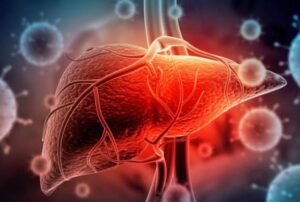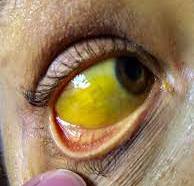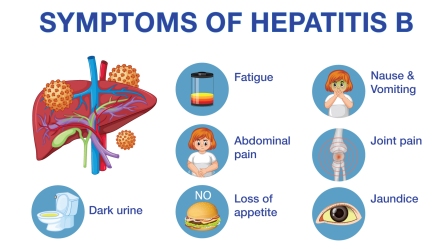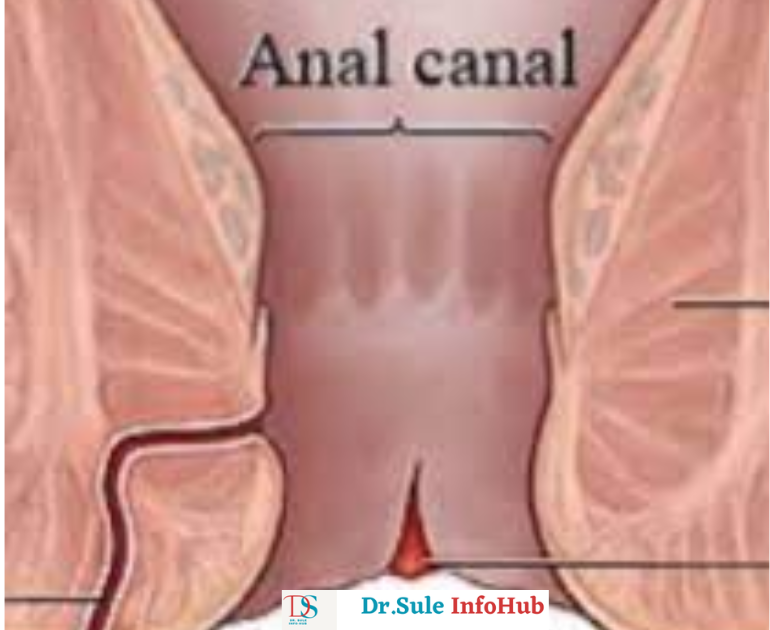Hepatitis is a condition of the liver caused by viral infections, with various types of hepatitis viruses posing different challenges to public health.
Today, we will see details of the different types of hepatitis, their causes, symptoms, diagnosis, treatment options, and preventive measures to raise awareness and promote a better understanding of this critical health concern.
What is Hepatitis?
- Hepatitis is an infection or inflammation of the liver tissues that causes damage to the liver.
- The liver is the largest organ of the body. This organ is responsible for crucial functions such as the detoxification of blood, nutrient processing digestion, production of bile, storage of glycogen and protein production.
- When the liver becomes inflamed due to viral infection, it can lead to hamper health routines. In our country, the main cause of Hepatitis is a viral infection.
- There are five different types of hepatitis viruses, categorized as hepatitis A, B, C, D, and E, each with its specific mode of transmission and potential consequences.
- Hepatitis A and Hepatitis E cause short-term illness. Hepatitis B, C, and D cause long-term illness.
Types of Hepatitis-
1. Hepatitis A 2. Hepatitis B
3.Hepatitis C 4. Hepatitis D
5. Hepatitis E

Causes of hepatitis-
- The major cause of hepatitis is Infectious cause i.e. viral infection and other is a non-infectious causes
I) Infectious causes –
1. Hepatitis A
Hepatitis A is commonly transmitted through the consumption of contaminated food or water or close contact with an infected person. It often causes acute hepatitis, characterized by symptoms like fatigue, jaundice, abdominal discomfort, nausea, and loss of appetite. The good thing is that most people cure fully of hepatitis A without any specific treatment, and vaccination is available for prevention. Hepatitis A can be cured by lifestyle modification. Hepatitis A causes acute illness.
2. Hepatitis B
Infected blood, semen, vaginal secretion or other infected body fluids spread hepatitis B. Hepatitis B can lead to severe chronic liver disease. Antiviral medications are used to manage chronic hepatitis B, and vaccination is crucial for prevention, especially for at-risk individuals.
3. Hepatitis C
Hepatitis C is primarily transmitted through blood-to-blood contact, making intravenous drug use and unsafe medical procedures common routes of transmission. Hepatitis C can cause chronic liver disease.
4. Hepatitis D
Hepatitis D is a rare and severe form of hepatitis only in individuals infected with hepatitis B. It can worsen the outcome of hepatitis B and lead to more severe liver disease. Hepatitis D only occurs in conjunction with hepatitis B as the virus only multiplies with the presence of hepatitis B.
5. Hepatitis E
- Hepatitis E is water born disease caused by the hepatitis E virus. Hepatitis E also causes short-term illness. Hepatitis E especially affects pregnant ladies.
- Hepatitis E is primarily transmitted in regions with poor sanitation. While it can cause acute hepatitis, it is usually self-limiting and rarely leads to chronic liver disease. Improving water sanitation and hygiene practices is crucial for prevention.
II) Non-infectious causes:
- Excessive alcohol consumption Like in Fatty Liver, this type is known as alcoholic hepatitis.
- Some autoimmune diseases like Celiac disease, Asthma, Systemic lupus erythematosus, and Hushimoto’s thyroiditis.
How Does Hepatitis Spread?
- Understanding the modes of hepatitis transmission is essential for prevention. Hepatitis can spread in various ways, depending on the type of virus.
- Contaminated Food and Water: Hepatitis A and E are typically transmitted through the consumption of contaminated food or water, especially in regions with inadequate sanitation.
- Blood-to-Blood Contact: Hepatitis B, C, and D are primarily spread through contact with infected blood or blood products. This can occur through shared needles, unsafe medical procedures, or transfusions with unscreened blood.
- Needle Sharing – especially among drug users.
- Sexual Contact: Hepatitis B and C can be transmitted through unprotected sexual intercourse with an infected partner. The use of condoms during sex may reduce the transmission of hepatitis.
- Mother-to-Child Transmission: Infected mothers can pass hepatitis B to their infants during childbirth. Timely vaccination of newborns born to infected mothers can prevent transmission.
Symptoms and signs of hepatitis:
- Hepatitis symptoms vary depending on the virus type and whether the infection is acute or chronic. Some people may remain asymptomatic, while others may experience the following:
Icterus
1. Acute Hepatitis
- Fever
- Dark urine
- Fatigue and Weakness: Feeling tired and weak is a common symptom of acute hepatitis that lasts for weeks.
- Jaundice: Jaundice causes the skin and eyes to appear yellow (Icterus) due to the buildup of bilirubin, a yellow pigment, in the body.
- Abdominal Pain and Discomfort: Some individuals may experience abdominal pain or discomfort, especially in the upper right quadrant of the abdomen.
- Nausea and Vomiting: Nausea and vomiting are common symptoms, particularly in the early stages of -the infection.
- Loss of Appetite: Hepatitis can lead to a reduced desire to eat, resulting in loss of appetite and unintended weight loss.
2. Chronic Hepatitis
- Chronic Hepatitis develops slowly so signs and symptoms may be hard to notice.
- Chronic hepatitis may have mild or no symptoms initially, making it challenging to detect. As the disease progresses, the patient suffers symptoms like:
- Persistent Fatigue: Chronic hepatitis can lead to fatigue and reduced energy levels, affecting daily life and productivity.
- Sudden Weight Loss: Unexplained weight loss is a common symptom of advanced liver disease, indicative of worsening health.
- Easy Bruising and Bleeding: Liver damage may affect blood clotting, leading to easy bruising and bleeding.
- Fluid Accumulation in the Abdomen: Cirrhosis, a late-stage liver disease, can cause fluid to accumulate in the abdomen, leading to abdominal swelling and discomfort.
- Spider-Like Blood Vessels on the Skin: The development of spider nevi, small clusters of blood vessels, is associated with liver disease and can be visible on the skin.
Hepatitis Symptoms
Diagnosis of Hepatitis
- To make a diagnosis, your doctor may first review your medical history.
- Early diagnosis of hepatitis is essential for prompt management and to prevent further liver damage.
1. Physical Examination
- During a physical examination, the doctor will look for signs of jaundice, like yellowish discolouration of the eyes, the liver’s size and texture, and inquire about symptoms and risk factors.
2. Blood Tests
- Blood tests play a central role in diagnosing hepatitis. Do CBC, LFT, and HBSAG.
- Enzymes increase in LFT.
- Liver function tests (LFT) can assess the liver’s overall health and how well it is functioning.
- HBSAG confirm infection of Hepatitis B.
- Specific markers and antibodies help identify the type of hepatitis virus and determine its activity level
- Anti-HCV test to detect antibodies to Hepatitis C virus.
- PT-prothrombin time
3. Liver Biopsy
In some cases, a liver biopsy may be performed to assess the degree of liver inflammation and fibrosis. A little sample of liver tissue is taken and inspected under a microscope to see the severity of liver damage.
4. Imaging Tests
Ultrasound may be used to visualize the liver and detect any structural abnormalities or signs of liver damage. This test can reveal liver has any tumour or fluid around the abdomen.
Treatment for Hepatitis
The treatment approach for hepatitis depends on the type and severity of the infection. Some cases may be cured by only lifestyle modification and some cases may need medical attention.
Hepatitis A -needs no drug therapies to treat.
- Take rest.
- take high calorie, low-fat diet.
- If nausea and vomiting are present give Antiemetic drugs.
- If the patient is very fatigued then admit him to the hospital and give him IV fluid and electrolyte replacement. Maintain good hygiene.
Hepatitis B-
- For chronic hepatitis B and C, antiviral medications are commonly used to reduce viral replication and prevent further liver damage. These medications are prescribed based on the patient’s specific condition, and regular monitoring is essential to assess treatment effectiveness.
- Give vitamin supplements and avoid alcohol. Rest is also important.
Hepatitis C-Early diagnosis and treatment with antiviral medications can significantly improve outcomes.
Hepatitis D– Preventing hepatitis B through vaccination is key to avoiding hepatitis D.
Hepatitis E– There is no specific treatment. As the disease is usually self-limiting, hospitalisation is not required. Take proper diet, rest. Maintain good hygiene.
Lifestyle Changes
Patients with hepatitis are advised to make certain lifestyle changes to support liver health and overall well-being. Avoiding alcohol is crucial, as it can exacerbate liver damage. A balanced diet, regular exercise, and sufficient rest are essential components of a healthy lifestyle.
Liver Transplant
In severe cases of liver damage or cirrhosis
Conclusion
- In conclusion, hepatitis is a very serious infection and a global challenge.
- Prevention is a key aspect of managing hepatitis. Vaccination against hepatitis A and B is highly recommended, especially for high-risk individuals. Practising safe sex,
- Early diagnosis through physical examinations and blood tests is essential for effective treatment and preventing further liver damage. For chronic hepatitis B and C, antiviral medications play a vital role in reducing viral replication and managing the disease.
- Living with hepatitis requires adopting a healthy lifestyle, including a balanced diet, regular exercise, and avoiding alcohol consumption.
Frequently Asked Questions (FAQs)
Q: Is hepatitis contagious?
A: Yes, hepatitis is contagious. The various types of hepatitis can spread through contact with infected bodily fluids, contaminated food or water, and other means of transmission.
Q: Can hepatitis be cured?
A: The treatment and outcome of hepatitis depend on the type and stage of the infection. Acute hepatitis A often resolves on its own without specific treatment. Chronic hepatitis B and C can be managed with antiviral medications, but a complete cure may not always be possible.
Q: Who is at higher risk of hepatitis?
A: Individuals at higher risk of hepatitis include those who engage in unprotected sexual activities, inject drugs, have multiple sexual partners, work in areas where severe exposure to infected blood, and live in regions with poor sanitation.
Q: Can I prevent hepatitis through vaccination?
A: Yes, vaccination is a crucial preventive measure against hepatitis A and B. Vaccination can effectively reduce the risk of infection and is recommended, especially for at-risk individuals.
Q: What are the symptoms of hepatitis?
A: The symptoms of hepatitis can include fatigue, jaundice (yellowing of the skin and eyes), abdominal pain, nausea, loss of appetite, and easy bruising or bleeding. However, some people with hepatitis may remain asymptomatic.
Q: How is hepatitis diagnosed?
A: Hepatitis is diagnosed through physical examination, and blood tests to detect viral markers USG to assess liver health. and liver function, liver biopsy for tissue analysis, and imaging tests like ultrasound,
Q: Can hepatitis be transmitted through sexual intercourse?
A: Yes, hepatitis B and C can be transmitted through unprotected sexual contact with an infected partner. use condoms.
Q: Can a mother with hepatitis transmit the virus to her baby during childbirth?
A: Yes, a mother infected with hepatitis B can transmit the virus to her baby during childbirth. Timely vaccination of the newborn can prevent transmission.
Q: Is there a vaccine for hepatitis C?
A: Currently, there is no specific vaccine available for hepatitis C. Prevention primarily focuses on avoiding behaviours that can lead to exposure to infected blood, such as sharing needles or syringes.
Q: Can I lead a normal life with chronic hepatitis?
A: With appropriate medical management and lifestyle changes, many individuals with chronic hepatitis can lead a relatively normal life. Regular monitoring and adherence to prescribed treatments are essential for managing the condition effectively.
Remember, if you suspect you have hepatitis or are at risk, seek medical advice from a healthcare professional. Early detection and intervention can make a significant difference in managing the disease and protecting your liver health.





1 thought on “ Hepatitis : What You Must Do! 5 types of Hepatitis Disease”